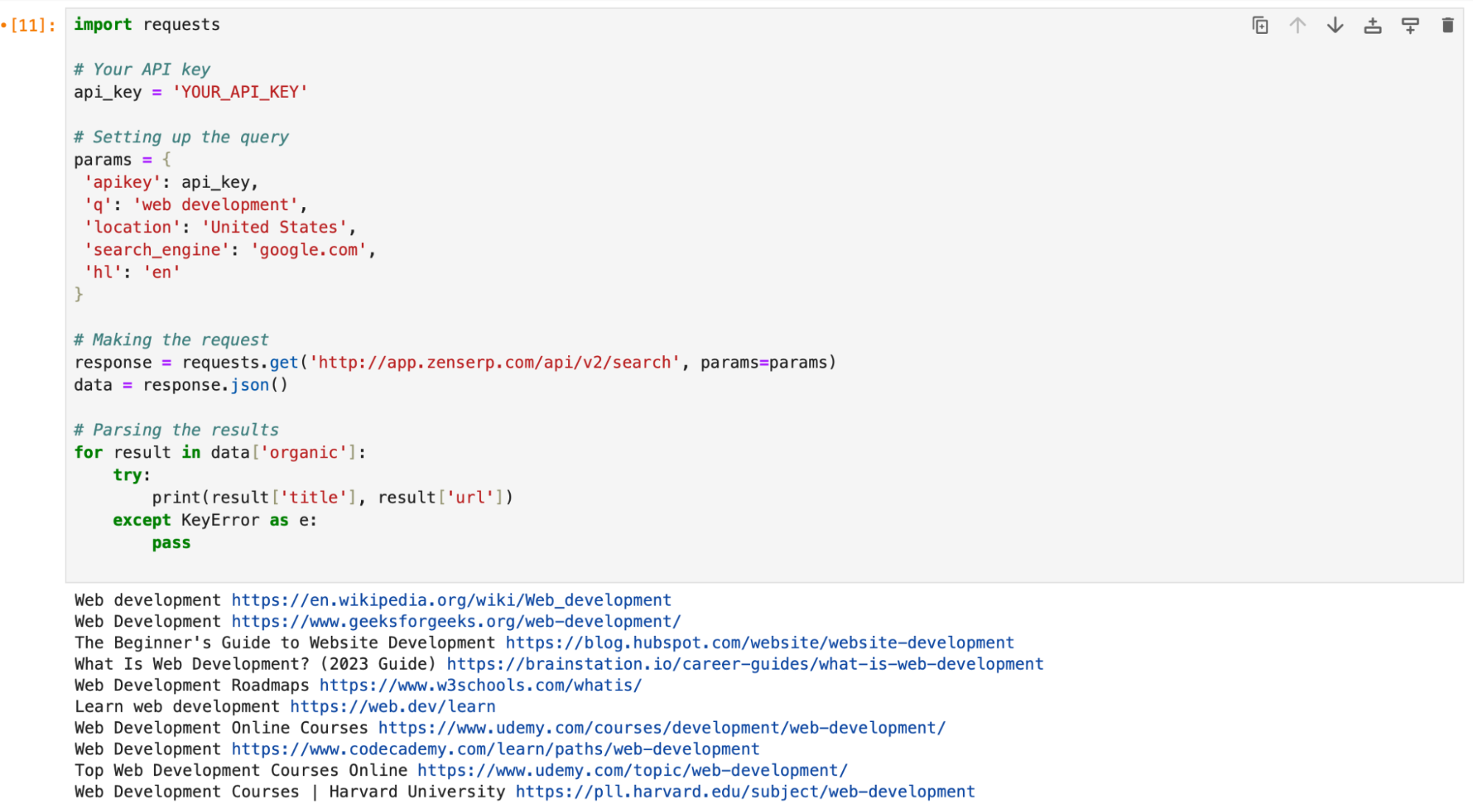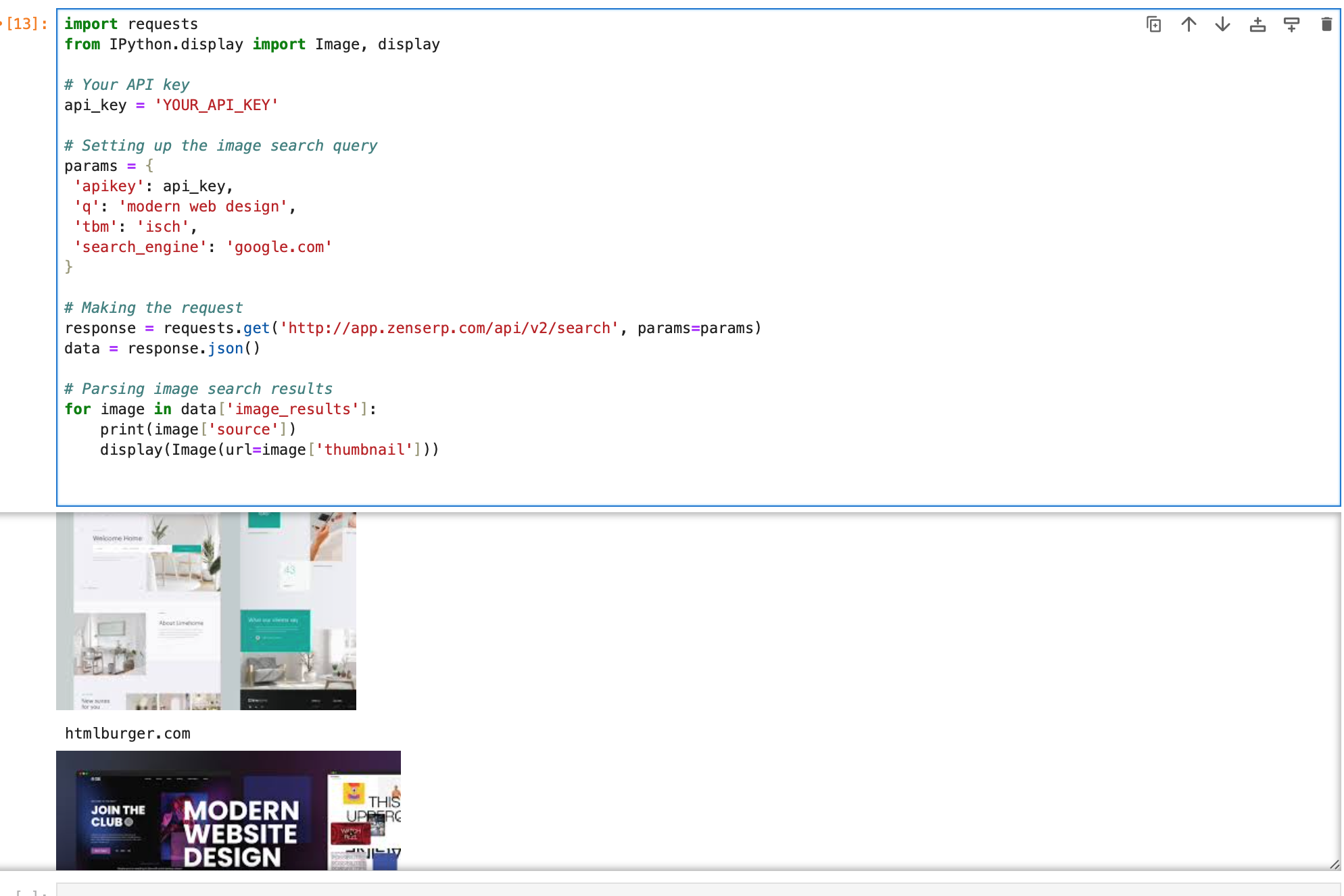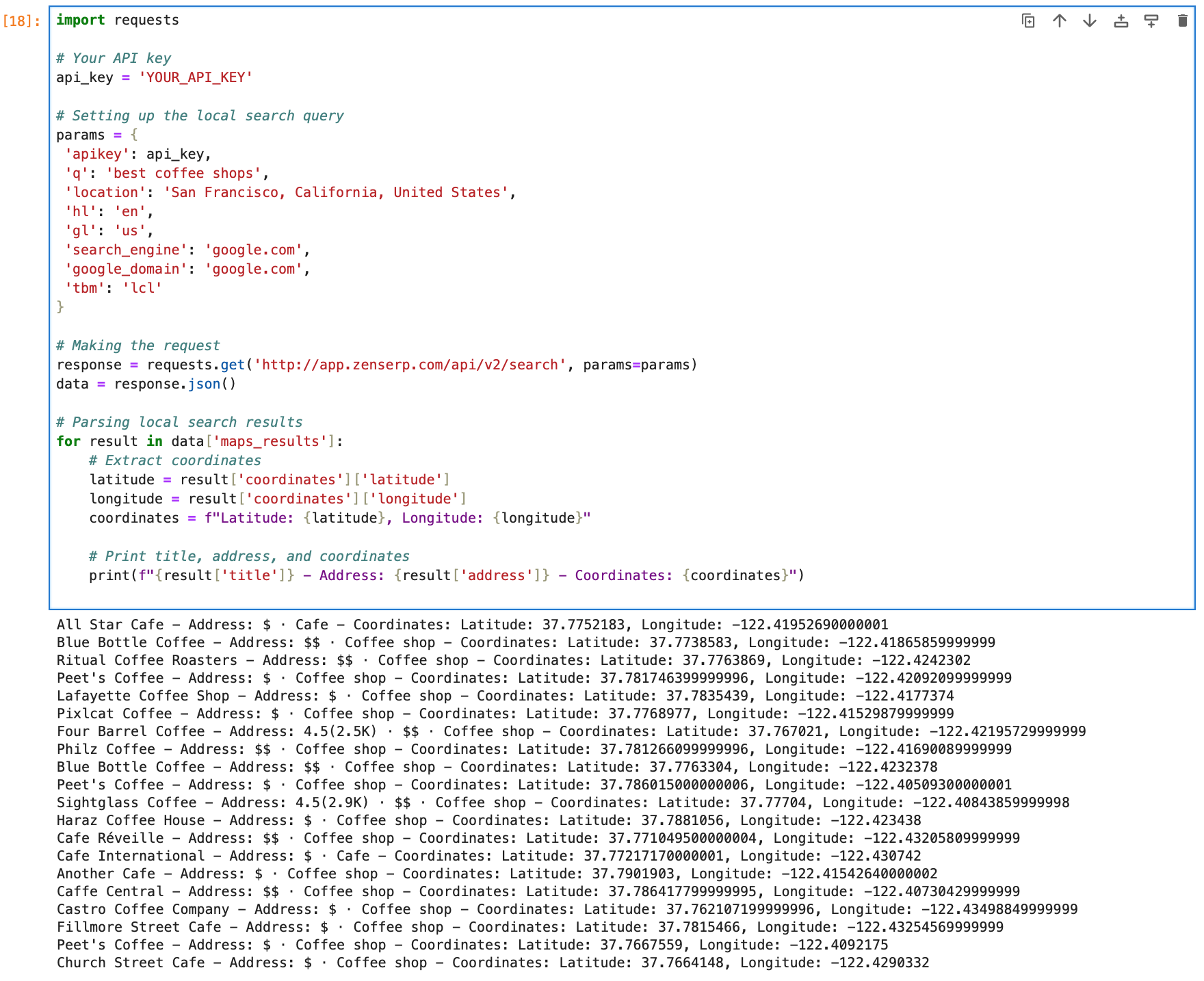This article was created in partnership with APILayer. Thank you for supporting the partners who make SitePoint possible.
In the fast-paced world of web development, staying ahead in the game often means leveraging the best tools available. Zenserp, a powerful API for search engine result parsing, emerges as a critical tool for developers looking to enhance their projects with real-time, accurate search data.
What is Zenserp?
Zenserp is a versatile API tailored for scraping and parsing results from multiple search engines with remarkable precision.
This tool offers the capability to programmatically query not just one but various search engines, receiving the results in a well-structured, accessible format. It supports major search engines like Google, Bing, and Yahoo, among others, making it a highly adaptable tool for diverse web scraping needs.
Zenserp is especially valuable for projects that demand real-time search data from multiple sources, comprehensive SEO analysis, or extensive market research. Its broad search engine compatibility ensures that users can gather a wide range of insights and data essential for informed decision-making in the dynamic world of web development and digital marketing.
Key Features
- Real-time data. Zenserp provides up-to-the-minute search results, crucial for applications that depend on the latest information.
- Scalability. Designed to handle requests at scale, Zenserp ensures consistent performance even under heavy load.
- Customizable parameters. Users can customize queries based on language, location, and search type, providing tailored results.
- Simple integration. With clear documentation and support for multiple programming languages, integrating Zenserp into existing projects is straightforward.
Practical Applications
- SEO optimization. Web developers can use Zenserp to track keyword rankings and optimize websites accordingly.
- Market analysis. Companies can analyze search trends to understand market dynamics better.
- Content strategy. By understanding what users are searching for, content creators can tailor their strategies to meet audience needs.
Business Case Use: Competitive Intelligence Gathering
In digital marketing and strategic planning, competitive intelligence is key. Zenserp can play a crucial role in this aspect by enabling businesses to gather and analyze competitor data efficiently.
By using Zenserp to monitor competitors’ search engine rankings, keyword strategies, and online presence, companies can gain valuable insights into market trends, competitor moves, and potential areas for improvement in their own strategies. This intelligence can inform everything from SEO campaigns to content creation, ensuring that a business stays competitive and relevant in its market.
Getting Started with Zenserp
Integrating Zenserp into your project is a straightforward process. Here’s a basic guide:
- Sign up for Zenserp. Create an account and obtain your API key.
- Choose your language. Zenserp supports various programming languages like Python, JavaScript, and PHP.
- Make your first request. Use the API to send a query and receive JSON-formatted results.
Example 1: Tracking keyword rankings in Python
import requests
# Your API key
api_key = 'YOUR_API_KEY'
# Setting up the query
params = {
'apikey': api_key,
'q': 'web development',
'location': 'United States',
'search_engine': 'google.com',
'hl': 'en'
}
# Making the request
response = requests.get('http://app.zenserp.com/api/v2/search', params=params)
data = response.json()
# Parsing the results
for result in data['organic']:
try:
print(result['title'], result['url'])
except KeyError as e:
pass
This code snippet is a Python script that utilizes the Zenserp API to perform a search query and process the results. Here’s a breakdown of what each part of the code does:
-
Importing the requests library. The
requestsmodule is imported at the beginning. This module is a popular HTTP library in Python used for making requests to web servers. -
API key configuration. The
api_keyvariable is set with a placeholder for a Zenserp API key. This key is necessary for authenticating requests to the Zenserp API. -
Setting up the query parameters. The
paramsdictionary is configured with several parameters for the API request:'apikey'. This is set to theapi_keyvariable, allowing authenticated access to the API.'q'. The search query, in this case,'web development'.'location'. The geographical location for the search, here specified as'United States'.'search_engine'. The search engine to be used, which is'google.com'in this case.'hl'. The language parameter, set to English ('en').
-
Making the API request.
- The script makes a GET request to the Zenserp API endpoint (
'http://app.zenserp.com/api/v2/search') with the parameters specified in params. - The response from the API is stored in the response variable.
- The script makes a GET request to the Zenserp API endpoint (
-
Processing the API response.
- The response from the API is converted from JSON format to a Python dictionary using
response.json(). - This data is stored in the
datavariable.
- The response from the API is converted from JSON format to a Python dictionary using
-
Parsing and printing the results.
- The script iterates over the items in the
data['organic']list, which contains the organic (non-paid) search results. - For each result in this list, it attempts to print the
titleandurl. These fields represent the title and URL of each search result, respectively. - A
try-exceptblock is used to handle anyKeyError. This error would occur if a result does not have either a'title'or'url'field. In such cases, the script simply passes over that result without printing anything.
- The script iterates over the items in the
In summary, this code conducts a web search for 'web development' using the Zenserp API, targeted for the United States on Google, and processes the search results to print the title and URL of each organic result. It’s a useful script for gathering search engine data programmatically, particularly for SEO analysis, market research, or any application where understanding search engine results is valuable.
Additional Python Examples
Example 2: Extracting image search results
import requests
from IPython.display import Image, display
# Your API key
api_key = 'YOUR_API_KEY'
# Setting up the image search query
params = {
'apikey': api_key,
'q': 'modern web design',
'tbm': 'isch',
'search_engine': 'google.com'
}
# Making the request
response = requests.get('http://app.zenserp.com/api/v2/search', params=params)
data = response.json()
# Parsing image search results
for image in data['image_results']:
print(image['source'])
display(Image(url=image['thumbnail']))

This script — which you can run in Jupyter Notebook — uses Zenserp to perform an image search on Google, returning results that include the image source and thumbnail.
This code snippet is designed for a scenario where you need to programmatically search for images related to a specific query — in this case, "modern web design" — using the Zenserp API, and then display these images along with their sources. Here are a few practical situations where this code could be highly useful:
- Web development and design inspiration. If you’re a web developer or designer looking for inspiration or examples of modern web design, this script can quickly fetch a variety of relevant images. This automated process saves time compared to manual searching.
- Content curation for digital marketing. Digital marketers or content creators might use this code to gather images for blog posts, social media content, or presentations. By automating the search and retrieval process, they can efficiently source visual content that aligns with the theme of their project.
- Educational purposes. Educators or trainers teaching web design could use this script to fetch real-time examples of modern web design trends to show to their students, making the learning process more interactive and up to date.
- Research and analysis. Researchers conducting studies on web design trends can use this script to collect a sample of current designs. This could be useful for academic research, market analysis, or competitive analysis in the field of web development.
- Portfolio building. Web designers building their portfolio might use this code to find and display the latest trends in web design, both for inspiration and to showcase their understanding of current styles and technologies.
In each of these scenarios, the key advantage of using this code powered the Zenscrape API is its ability to automate the process of retrieving and displaying relevant images from the web, saving significant time and effort while providing up-to-date and diverse visual content.
Example 3: Local search with specific location
import requests
# Your API key
api_key = 'YOUR_API_KEY'
# Setting up the local search query
params = {
'apikey': api_key,
'q': 'best coffee shops',
'location': 'San Francisco, California, United States',
'hl': 'en',
'gl': 'us',
'search_engine': 'google.com',
'google_domain': 'google.com',
'tbm': 'lcl'
}
# Making the request
response = requests.get('https://app.zenserp.com/api/v2/search', params=params)
data = response.json()
# Parsing local search results
for result in data['local_results']:
print(result['title'], result['address'])
This example demonstrates how to use Zenserp for local searches, specifying a location to get relevant local business listings.
Conclusion
Zenserp is an invaluable tool for developers and digital marketers who need to integrate real-time search engine data into their projects. Its ease of use, scalability, and customizable features make it an essential tool in your web development arsenal. Whether you’re optimizing for SEO, conducting market research, or developing a content strategy, Zenserp offers the data and insights you need to succeed.
Navigating the complexities of search engine data for actionable insights and strategic analysis is no longer a pursuit confined to developers with advanced coding skills. With the advent of tools like Zenserp, the field of search engine result parsing has been democratized, making it accessible to a wider range of professionals.
Zenserp, a cutting-edge API, has transformed the way we extract and analyze data from various search engines, bringing a level of precision and ease that was once thought to be the exclusive realm of expert programmers. This evolution in technology empowers a diverse array of users, from digital marketers to data analysts, to harness the power of search engine data for comprehensive analysis, trend tracking, and informed decision-making.
If you have any questions, reach out to the Zenserp team.
 Christopher Collins
Christopher CollinsChristopher Collins is a Data/Business Analyst and a prolific writer in technology and space. He contributes to Medium publications like AI Corner, Better Programming, Coinmonks, and InsiderFinance Wire. Christopher holds a Masters in Data Analytics and a First Class Honors HDip in Computer Science. His professional journey includes roles as Director/CTO, enhancing his expertise in data analytics, strategic planning, and software development.




